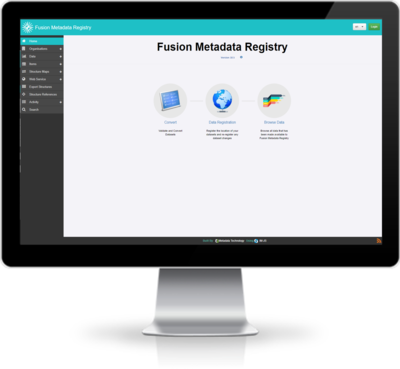Main Page
Jump to navigation
Jump to search
Fusion Metadata Registry (FMR) Knowledge Base
Topics
Latest News
Upgrading for Version 10 to Version 11
If you are using Version 10 (or earlier) and want to move the the SDMX 3.0 standard you will need to follow a specific process to ensure a successful upgrade More
New in Version 11
Using Fusion Metadata Registry
| Quick Start Guide | Install and configure a basic FMR installation |
| How to Guides | Guidance on specific tasks using FMR |
| Configuration Reference | Configuring FMR |
| Structural Metadata Management | Creating and maintaining SDMX structures using the FMR web user interface |
SDMX 2.1 Theory
| Concepts Reference | Explanation of key concepts and terms used in SDMX |
| Structures Reference | Details on each of the key 'maintainable' and 'identifiable' SDMX structures |
| Formats Reference | Details on each of the data and structure formats available in Fusion Metadata Registry including XML, JSON and CSV |
| REST API Web Services Reference | Purpose, parameters, request content and response content for each of the published web services together with examples |
About Fusion Metadata Registry
Fusion Metadata Registry 10 implements the SDMX 2.1 specification for a structural metadata registry.
See the Change Log for details of the latest version, bug fixes and updates.
Key Features
- SDMX structural metadata registry compliant with the SDMX 2.1 specification
- Formats: SDMX-EDI, SDMX-ML 1.0, 2.0, 2.1, SDMX-JSON
- SDMX REST structure API
- Web user interface for browsing, authoring and maintaining structures
- Validator for checking that SDMX data complies with the structural metadata
- Transformer for executing SDMX Structure Maps
Use Cases
- Repository for SDMX structural metadata
- Interactively authoring and maintaining SDMX structures using the web user interface
- SDMX structural metadata REST API service
- Data validation - validate that data complies with SDMX structures
- Data transformation - transform data into different structures and coding schemes using SDMX Structure Mapping
- Data conversion - convert data between SDMX versions and formats
- Data collection - use the metadata to generate Excel data reporting templates which data providers need only to complete and return
